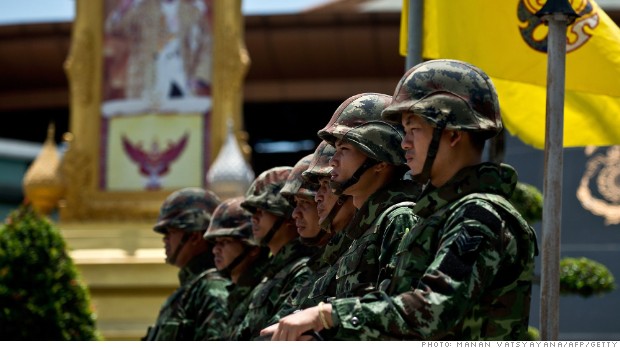FORTUNE — Yesterday Thailand’s military leadership went on state TV and announced they were seizing power. Vowing to “restore peace in a short time and reform government policy,” the generals formed the “National Peace and Order Maintaining Command,” dissolved the cabinet, threw out the constitution (itself the product of the country’s 2006 coup) and declared a curfew from 10 p.m. To 5 a.m. TVs across the country broadcast a static image of a Thai military logo and patriotic songs as news of Thailand’s 19th military coup in 82 years—a handful of those weren’t successful—sunk in.
Not a first, certainly. Military coups in Thailand happen almost as often as American presidential elections. And though Thailand’s military had hinted they were done with all that, No. 19 was not totally unexpected. Gripped by political conflict for years (since its last coup, really), the country had recently arrived again at political impasse: For months there have been rumors of impending military intervention and on Tuesday, the military imposed martial law.
Still, the coup’s timing was peculiar—a sharp turn in an afternoon that had brought the nation’s political leaders to the Thai Army Club, ostensibly to talk their way to a resolution of the crisis. (This was the second day of army-brokered negotiations and a military spokesperson had characterized the first as ‘positive.’)
MORE: Can Thailand keep from falling apart?
Obviously, that didn’t happen. The junta detained the political leaders, and then announced on TV they were taking over. They rounded up 150 more today, including Yingluck Shinawatra, the Thai Prime Minister who was ousted two weeks ago by the nation’s Constitutional Court.
So what does this mess mean for Thailand and its already weakened economy.
As I’ve written before, Thailand has traditionally weathered coups and political instability quite well. Its last coup, which ousted media tycoon-turned-PM Thaksin Shinawatra (the brother of the recently ousted prime minister) in 2006, was even called the “silk coup” it went down so smoothly. The morning after tanks rolled in, Thais were on the streets presenting soldiers with roses.
In a note earlier this week, Barnabas Gan, an analyst with OCBC Bank, wrote, “Historically, a military intervention has been effective in ending political strife and establishing a legitimate government presence.” He added that martial law was likely just the Ya Kom or bitter medicine the politically and economically ailing nation needed.
Yet, there are also reasons to think things will not be so, uh, rosy this go round. A lot has happened since 2006—much of it the fallout from that smooth-as-silk coup. Shinawatra, who lives in self-imposed exile in Dubai, nevertheless remains popular and at the heart of Thailand’s political problems. (Since being deposed, he’s had a cousin, a younger sister, and a close business crony in the seat of power). His political base, much of which comes from Thailand’s rural provinces, is increasingly wealthy, educated, and unwilling to tolerate the undemocratic developments dealt them by the country’s elites. That anti-coup demonstrations sprung up today in Bangkok is a show of that and a sure sign the coup will only add to that list of grievances and to the likelihood of more violence.
Ultimately, that will not be a good thing for business. Nor in the very short term, will the post-coup curfew, which has already disrupted tourist plans—even Bangkok’s notoriously seedy red light districts reportedly shut down—and night shifts at the nation’s many automobile plants. (Honda, Toyota and Ford are among car manufacturers there.)
Adithep Vanabriksha, CIO at Aberdeen Asset Management Thailand, says much of the country’s economic fate relies on how quickly the junta can live up to their name. “Going forward, key questions remain unanswered: who will lead the interim government, how long the military will remain in control, when the next elections will be held. The effectiveness of the interim government and the speedy return to electoral democracy will be key to reviving the sagging economy.”
That’s no easy task. He adds, “Longer term, the underlying reasons for the deep divisions are still haunting Thailand and will need to be addressed before a lasting solution can be found.”







